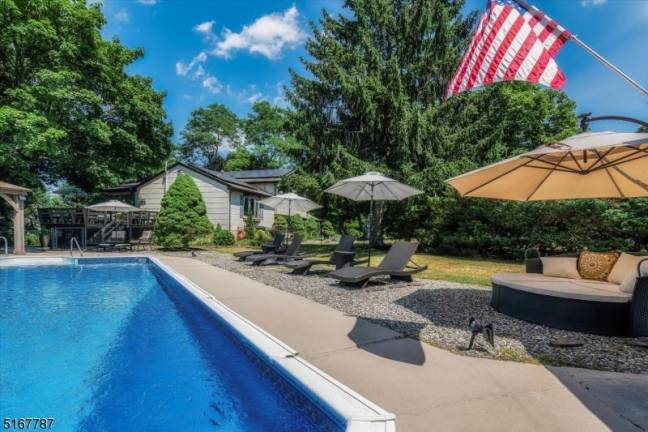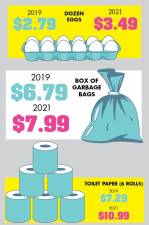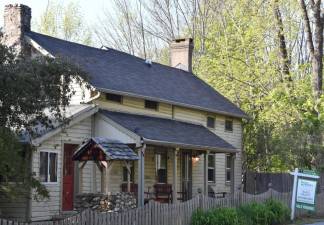Higher interest in local homes
Housing. Local realtors say low inventory across the tri-state area continues to fuel a competitive housing market. But increased interest rates are now resulting in price adjustments instead of bidding wars.

At first glance, it looks like housing costs are continuing to soar. In Sussex County, NJ, a three-bedroom, two-bathroom home is going for $341,923, up from $325,023 in 2021. In Orange County, NY, it’s now $369,000, up from $310,230 last year. And over the border in Milford, Pennsylvania, a three-bedroom home is $400,000, up from $325,000 last year.
But for the first time since the pandemic pushed city dwellers to buy up homes in local suburbs, the tide is starting to change.
“It was ticking upward, but in the last 90 days or so, prices have started to flatten out, if not come down slightly,” explained Realty Executives broker and Manager Nicole Monahan. This time last year, her Pike County office may have seen one or two listings with price reductions. Nowadays, it’s more like 20.
“I think we’ve definitely hit the peak of where we’re going to be at,” she added.
Green Team Realty’s associate broker Jennifer DiCostanzo is seeing a similar pattern in Orange County. “Year to date, we’re up about 17% from 2021... The sales prices that have closed to date are generally above asking,” she explained. But in the last 50 days, “we’ve started to see price adjustments that we haven’t seen in the past two years.”
And houses that are on the market right now are “softening with the pricing,” added DiCostanzo. “We still have low supply, but we don’t have that pandemic push of demand.”
Moving costs
Meanwhile, workplace changes and the rising cost of living is pushing homeowners to sell.
“We are now in a shift,” said DiCostanzo. “We are starting to see homes that were recently bought during the pandemic in the last two years, have now come back to market because of the change of the workforce.”
Monahan is also seeing multiple pandemic purchases go back up for sale — primarily, those made by families who bought second homes and while working remotely. “Now, some of these people are being forced to go back to the office,” she said. “Or, some of these people who bought a second home, with the economy the way it is and gas prices, maybe they’re not being able to use that second home the way that they were, or can’t afford the back-and-forth, or the multiple payments anymore.”
Monahan predicted that foreclosures will be on the rise in the next 18 months. “Usually it starts with car repossessions, and car repossessions have started to increase again.”
Interest vs. inventory
Since local inventory is still low, houses that are priced to sell or have highly desired amenities will still get multiple offers or sell above asking, explained Weichert Realtors’ Dawn Corbo, who has worked as a realtor in northern New Jersey for over 30 years. “I don’t see that loosening up anytime soon, as long as we have limited inventory,” she said. But interest rates have caused “a slight adjustment.”
They were averaging around 3.5 - 4.5% last summer. Now, they’re more like 5 to 7%, according to Monahan.
“With interest rates rising... a buyer becomes possibly in a different price range, so we as real estate professionals are adjusting what we’re selling to these buyers,” explained Corbo. “Where they thought they were at a $400,000 house may end up being something a little bit lower, like a $350,000 - $375,000 that they would have to work off of, because of monies down, what they can afford, everything gets factored in.”
The increase is enough to change a buyer’s budget. After finally finding the perfect home in Vernon, N.J., teacher Ben C.* and his wife nearly lost out on the deal two weeks before the anticipated closing date. Their lawyer missed a contingency that allowed the sellers to stay in the home for 60 days longer than anticipated.
“We were freaking out because we had locked in our mortgage rate in January before everything really spiked up, so we got it at 3.3%, and then it went up to like 5%," explained Ben.
They would lose the lower rate if they didn’t close in time. They agreed to buy the home at $365,000 in January, but in the months between signing the contract and closing, the value of the three-bedroom, three-bathroom house crept up to approximately $410,000 due to low housing inventory.
“So we had to do a lot of convincing with the sellers for them to close on the house and then rent it back to them so we could keep the mortgage rate,” he said. It wasn’t up until “the final moment, the final days,” just before they were at risk of losing their mortgage rate when the sellers agreed to close in time — but in return, the sellers would not make the originally promised repairs, which thus far has reportedly cost Ben’s family an additional $15,000.
“We really pushed for this house because of the mortgage rate,” he said. “Even when they said, ‘We’re not going to do the fixes,’ we were just like, ‘You could literally set the house on fire and we’re gonna take it, because we could not afford this house now if this house went back on the market. We would not be able to afford it whatsoever.”
*For privacy reasons, the paper agreed to only publish Ben’s last initial for this story.


